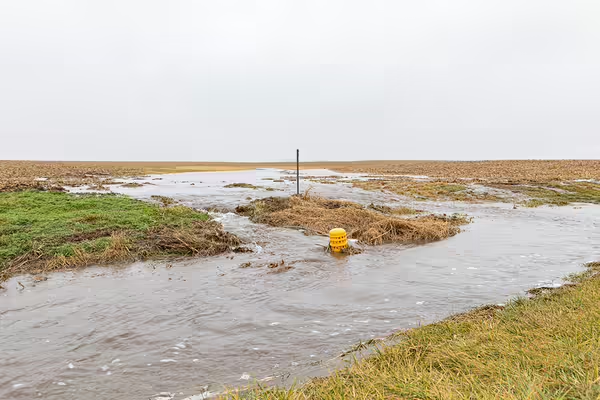
Thank you for your interest in the Integrated Water Management for Landowners and Farmers workshop. The workshop is canceled. For questions, please contact Talon Becker at tbecker2@illinois.edu, 217-300-0576.
URBANA, Ill. — In times of changing environmental conditions, unmanaged drainage water with a lack of soil conservation practices can impact farm profitability and sustainability of agricultural operations. Understanding management options starts with knowing what’s happening out in the fields and where to turn for resources.
Professionals from University of Illinois Urbana-Champaign and Illinois Extension are partnering up for a two-day workshop scheduled for Feb. 26 and 27. The Integrated Water Management Workshop for Farmers and Landowners will be held at the Farm Credit Illinois Regional Office at 1100 Farm Credit Dr., Mahomet.
Workshop attendees will spend two days interacting with university researchers as well as Extension and Natural Resources Conservation Service staff, learning how to improve water and nutrient management on their farms to enhance crop productivity while minimizing impacts on the environment.
The goal for this workshop is that attendees will leave with sufficient knowledge about agricultural water management practices and their implementation to provide confidence and a better working relationship with their contractor of choice. Presentation topics include the basics of integrated water management, soil drainage, conservation, nutrient loss reduction strategy, surface runoff, erosion, and more.
"This workshop will help farmers and landowners have an actionable roadmap and the necessary information and resources needed to improve water management and the long-term prosperity of their farmland,” says Bin Peng, assistant professor and Extension specialist in the department of crop sciences, part of College of Agricultural, Consumer and Environmental Sciences. Peng is also a faculty member at the Agroecosystem Sustainability Center, part of Institute for Sustainability, Energy, and Environment.
Peng shares that the workshop will specifically focus on treating the farmland as a holistic system that generates multi-faceted outcomes. The event will have an impact on landowners, farmers, and those interested in agricultural water management in Illinois.
Integrated Water Management Sessions:
Feb. 26 | 9 a.m. to 4:30 p.m.
- Introduction to Integrated Water Management
- Understanding Your Field
- Identifying the Problem and Weighing Your Options
- Nutrient Management for Better Nutrient Use Efficiency
Feb. 27 | 9 a.m. to 3:30 p.m.
- Integrated Water Management for Sustainable Production and Environmental Quality
- Surface Runoff Management and Soil Erosion Control
- Improving Soil Drainage
- Workshop Summary and Discussion
“This workshop will help farmers and landowners tackle common issues like poor drainage and nutrient loss, leading to better crop yields and healthier soil,” says Luciano Alves de Oliveira, assistant professor in the Department of Agricultural and Biological Engineering, part of College of ACES.
“Without these practices, it risks losing valuable nutrients, erosion problems, and now, more than ever, it’s important to stay ahead of changing weather and regulations to keep your farm sustainable and productive,” says Alves de Oliveira.
The cost to attend is $15 and includes lunch on both days for those who register before Feb. 19. Find the full agenda, including expanded topics, presenters, and registration at go.illinois.edu/IntegratedWater.
For questions or if you need a reasonable accommodation to participate, contact Talon Becker, Extension commercial ag specialist, at tbecker2@illinois.edu, 217-300-0576.
SOURCES: Bin Peng, assistant professor and Extension specialist, Department of Crops Sciences, College of Agricultural, Consumer and Environmental Sciences; Luciano Alves de Oliveira, assistant professor and Extension specialist, Department of Agricultural and Biological Engineering, College of Agricultural, Consumer, and Environmental Sciences; Talon Becker, commercial agriculture specialist, Illinois Extension.
WRITER: Jenna Braasch, media communications coordinator, Illinois Extension.
University of Illinois Extension develops educational programs, extends knowledge, and builds partnerships to support people, communities, and their environments as part of the state's land-grant institution. Extension serves as the leading public outreach effort for University of Illinois Urbana-Champaign and the College of Agricultural, Consumer and Environmental Sciences in all 102 Illinois counties through a network of 27 multi-county units and over 700 staff statewide. Extension’s mission is responsive to eight strategic priorities — community, economy, environment, food and agriculture, health, partnerships, technology and discovery, and workforce excellence — that are served through six program areas — 4-H youth development, agriculture and agribusiness, community and economic development, family and consumer science, integrated health disparities, and natural resources, environment, and energy.